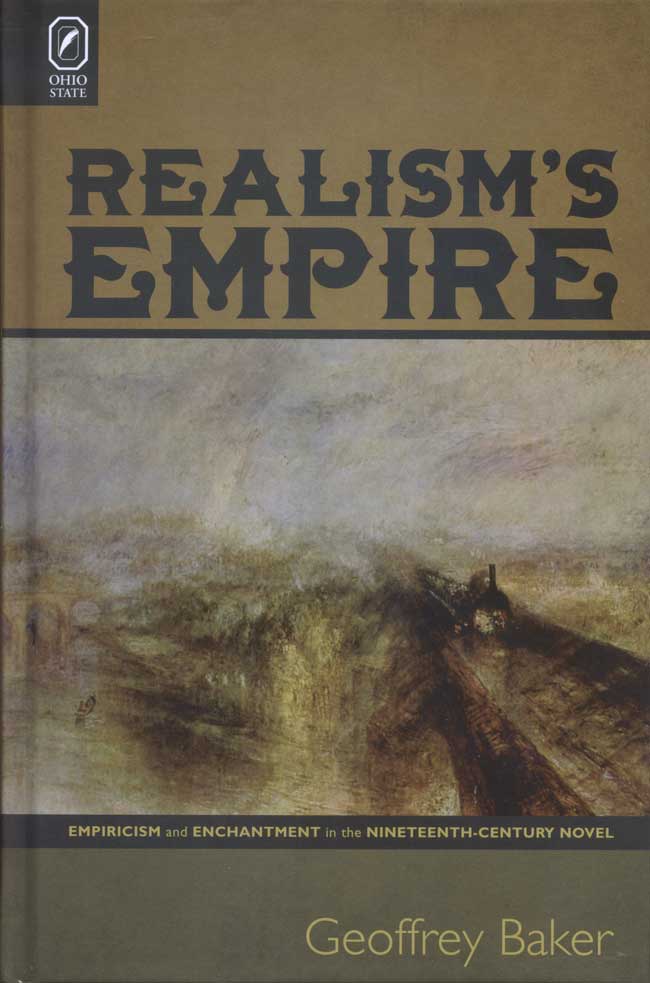Realism’s EmpireEmpiricism and Enchantment in the Nineteenth-Century NovelGeoffrey Baker |
 Jul 2009 Literary Criticism/European/General 246 pp. 6x9  $65.95 cloth 978-0-8142-1098-7 Add cloth to shopping cart $29.95 paper 978-0-8142-5610-7 Add paper to shopping cart $19.95 PDF ebook 978-0-8142-8013-3 Add PDF ebook to shopping cart Shopping Cart Instructions Review/Change Shopping Cart & Check-out | |||
| Table of Contents |
“Realism’s Empire is an ambitious attempt to link 19th-century literary Realism to the historical and cultural context of European imperialism. . . . [It] demands careful reading . . . as it offers a sweeping and convincing account of the intrinsic relation between Realism and imperialism in a study that is nicely balanced between close textual analysis and a broad literary-historical context.” —German Quarterly “Drawing on the theories of Franco Moretti and Edward Said, Baker considers not only the extent to which the novels attempt or fail to order a fractured national identity but also the degree to which political and cultural disruptions transform the novel as a genre. Relying on a sophisticated theoretical framework rather than historical or demographic data, Baker insightfully and thoroughly analyzes these novels, elaborating on his theoretical speculations as he progresses.” —Choice “The degree to which other nineteenth-century (and later) works can be shown to fit in (or flesh out) Baker’s metanarrative about European realism as a conflicted endeavor to revive and rationalize the colonial and the romantic in an increasingly interconnected but inequitable world is well worth exploring.” —Nineteenth-Century French Studies “Baker is particularly interested in junctures where the presence of the foreign drives the nineteenth-century novel to reconfigure realist space, and his readings of such moments are fascinating. . . . Realism’s Empire uses the idea of the magical, the foreign, and the romantic to obtain a critical leverage that allows readers to rethink the way space is represented in the novel.” —Victorian Studies “Realism’s Empire is a highly cohesive study. While many critics have written on the tension between romanticism and realism in nineteenth-century fiction, Baker’s approach grounds this tension historically and provides a systematic framework that accommodates many of its parameters.” —Gail Finney, professor of comparative literature and German, the University of California, Davis “In engaging with questions important to critics and theorists of postcolonialism, Geoffrey Baker offers a valuable argument for scholars reexamining the Western Canon in light of contemporary concerns about globalization. Baker’s scholarship is extensive, comprehensive, and impressive. He admirably synthesizes key theoretical and historical concepts to forge an original way of thinking about the interactions of foreign and native in several canonical fictions of the Western tradition.” —Carol Colatrella, professor in the School of Literature, Communication and Culture, Georgia Institute of Technology If realist novels are the literary avatars of secular science and rational progress, then why are so many canonical realist works organized around a fear of that progress? Realism is openly indebted, at the level of form and content, to imperialist and scientific advances. However, critical emphasis on this has obscured the extent to which major novelists of the period openly worried about the fate of mystery and the dissolution of tradition that accompanied science’s shrinking of the world. Realism’s modernization is inseparable from nostalgia. In Realism’s Empire: Empiricism and Enchantment in the Nineteenth-Century Novel, Geoffrey Baker demonstrates that realist fiction’s stance toward both progress and the foreign or supernatural is much more complex than established scholarship has assumed. The work of Honoré de Balzac, Anthony Trollope, and Theodor Fontane explicitly laments the loss of mystery in the world due to increased knowledge and exploration. To counter this loss and to generate the complications required for narrative, these three authors import peripheral, usually colonial figures into the metropolitan centers they otherwise depict as disenchanted and rationalized: Paris, London, and Berlin. Baker’s book examines the consequences of this duel for realist narrative and readers’ understandings of its historical moment. In so doing, Baker shows Balzac, Trollope, and Fontane grappling with new realities that frustrate their inherited means of representation and oversee a significant shift in the development of the novel. Geoffrey Baker is assistant professor of comparative and British literature at California State University, Chico. | |||

